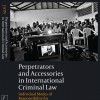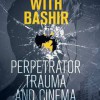Books

Encountering Genocide. Personal Accounts from Victims, Perpetrators, and Witnesses – Paul R. Bartrop
From the atrocities of the Holocaust to the ongoing horrors in Darfur, genocide has been a gruesome and all-too-prominent fixture of modern history. There is no better way to examine and understand these events than through the accounts of those involved. This unique collection of primary sources features 50 documents, some of which have never…
Read more
Perpetrators and Accessories in International Criminal Law. Individual Modes of Responsibility for Collective Crimes – Neha Jain
International criminal law lacks a coherent account of individual responsibility. This failure is due to the inability of international tribunals to capture the distinctive nature of individual responsibility for crimes that are collective by their very nature. Specifically, they have misunderstood the nature of the collective action or framework that makes these crimes possible, and…
Read more
Totalitarian Dictatorship. New Histories
This volume takes a comparative approach, locating totalitarianism in the vastly complex web of fragmented pasts, diverse presents and differently envisaged futures to enhance our understanding of this fraught era in European history. It shows that no matter how often totalitarian societies spoke of and imagined their subjects as so many slates to be wiped…
Read more
Waltzing with Bashir: Perpetrator Trauma and Cinema – Raya Morag
Waltzing with Bashir proposes a new paradigm for cinema trauma studies – the trauma of the perpetrator. Recognizing a current shift in interest from the trauma suffered by victims to that suffered by perpetrators, the book seeks to theorize this still under-studied field thus breaking the repression of this concept and phenomenon in psychoanalysis and…
Read more
The Mark of Cain. Guilt and Denial in the Post-War Lives of Nazi Perpetrators – Katharina von Kellenbach
The Mark of Cain fleshes out a history of conversations that contributed to Germany’s coming to terms with a guilty past. Katharina von Kellenbach draws on letters exchanged between clergy and Nazi perpetrators, written notes of prison chaplains, memoirs, sermons, and prison publications to illuminate the moral and spiritual struggles of perpetrators after the war….
Read more
The Holocaust, Fascism and Memory. Essays in the History of Ideas – Dan Stone
From interpretations of the Holocaust to fascist thought and anti-fascists’ responses, and the problems of memorializing this difficult past, this essay collection tackles topics which are rarely studied in conjunction. As well as historical analyses of fascist and anti-fascist thinking, Stone analyses the challenges involved in writing history in general and Holocaust historiography in particular….
Read more
